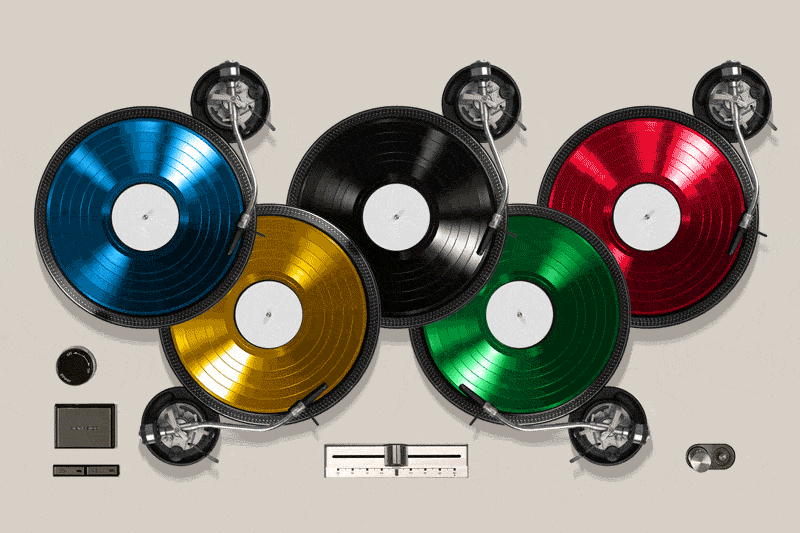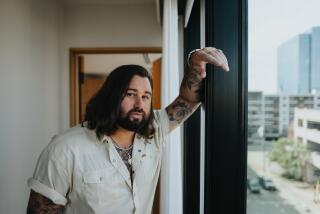It’s Building Up in Order to Emerge With a Bang
- Share via
DANA POINT — It’s a long stretch--geographically and culturally--from the streets of industrialized Birmingham, England, to the sunny shores of Dana Point, but Dave Wakeling seems to be making the transition. The former lead singer for the English Beat and General Public has been a local for three years now (he moved here after three years in Los Angeles, where the Rodney King riots drove him and his wife, Damessa, to seek tamer environs).
“I’m well on my way in my apprentice dude-ship--or is that dude-dom?,” Wakeling joked recently on the phone from his home.
He took a more serious tone when discussing his latest group, Bang, which since its formation in October has been generating a lot of excitement through regular appearances on the Southern California club circuit. Bang arose from the ashes of a General Public reunion last year that ended in bitterness; Wakeling now seems rejuvenated, focused and dedicated to his latest project.
“It’s hot; it’s happening, and it’s now, now, now,” he said. “I’m thrilled with it, actually. My idea was that I wanted to work with a small band--a four-piece--and I wanted in some ways to go back to the basics for myself. I wanted to have a tight, live band that worked on songs and did sound checks and only made a record after it had a group of songs it knew worked well in front of an audience. That’s really the rationale for Bang.
“It’s something that’s fairly aggressive, with good rhythm. I’m really chasing my punky reggae ideal. It’s got stripped-down, aggressive guitars, a lot of dub echoes, and the drummer is really a punk drummer who plays great reggae. Ska, punky reggae--it’s the same vibe. We play a lot of hits from the English Beat and General Public, and we play a group of new songs as we get them right.”
Bang--which also features guitarist Chris Karn, bassist Wayne Lothian and a drummer known only as Stoner--plays tonight at the Coach House in San Juan Capistrano.
So far, response to the group “has been fantastic,” Wakeling said. “Certainly the last month, something has seemed to ignite. The places we’ve played two or three times are now sold out and packed; people are bouncing off the walls. What’s exciting to me is that the new songs are starting to become as familiar as some of the biggest hits.”
Wakeling has said he is in no rush to showcase the band for record labels; he first wants to be sure that the new material is being performed to its fullest potential. Having been wrung through the corporate hit machine with General Public, he is taking a more proven and old-fashioned approach.
“There’s something about going into the studio with songs that you’ve played for people and they’ve worked. For all the computers and machinery that’s available, there’s still nothing with a ‘passion’ button on it. The only way to make things sound spirited is with a team that’s developed its own head of steam and its own personality.”
Wakeling was “born in 1956, and that makes me 34--put that in the paper and see if anybody calls you on it.” Growing up in Birmingham, he was attracted to the Motown hits he heard on the radio, and later to the ska-bluebeat music that came from the skinhead and suede-head movements in England in the early ‘70s.
“The skinheads and suede-heads developed out of immigrant Jamaican culture. The roots of the mod-skinhead-suede-head music and clothes were very much styled on the rude boy music and clothes that had come out of Jamaica. You’d go to a club that was playing ska, and there would be a nearly equal division in the crowd between black rude boys and white suede-heads, and there was no fighting along these lines at all.”
Contemporary neo-Nazi skinheads base their look on a style that was born in an environment of racial tolerance--an irony not lost on Wakeling, who is white and married to a black woman with whom he has two children.
“The latest statistics say there’s approximately 3,000 racist skinheads in America and approximately 10 million people who have one black parent and one white parent, so I don’t think there’s a question about what the long-term result is going to be,” he said.
The English Beat was the last and most commercially successful of the latter-day ska groups that came out of England in the late ‘70s, mixing Jamaican rhythm with punk energy. Making its recording debut with the superb “I Just Can’t Stop It” in 1980, the interracial English Beat joined the Specials, the Selecter, Madness and Bad Manners in a musical movement that spawned a cult that endures to this day.
“It was so excellent back then it’s hard to describe the feeling,” Wakeling recalls. “The thing about it was that none of it was planned or self-conscious. There was nothing strange-feeling about it, having people of different colors in the same group. We didn’t think we were doing anything special, but people were saying, ‘That’s so cool, people of different color playing together.’
“People thought it was some sort of sociological movement, but it was natural, and that’s why I think it had the effect that it did have. It’s very difficult to start a race war when everyone has just been to the same concert and was wearing the same clothes and listening to the same songs.”
The English Beat died a much-lamented death in 1983, whereupon Wakeling and fellow ex-Beat singer Ranking Roger formed the more poppy General Public. Wakeling readily admits that G.P.’s “latter efforts are marred by too much computer work.” Bang is intended as something of an antidote to G.P.’s corporate-mandated commercialism.
What drives Wakeling now is a desire to get back to the heart of what inspired him to play hard ska in the first place, and he says he is determined to do things his own way this go-round.
* Bang plays tonight at the Coach House, 33157 Camino Capistrano, San Juan Capistrano, on a bill with Grover’s Headache and My Superhero. 8 p.m. $10. (714) 496-8930.
More to Read
The biggest entertainment stories
Get our big stories about Hollywood, film, television, music, arts, culture and more right in your inbox as soon as they publish.
You may occasionally receive promotional content from the Los Angeles Times.








